Malaysia’s BRICS bid comes as it takes over the chairmanship of the Southeast Asian bloc next year.

KUALA LUMPUR: Malaysia could use the BRICS grouping of emerging economies to help expand the Association of Southeast Asian Nations’ (ASEAN) reach, when the country assumes the chairmanship of the regional bloc next year, said economists.
Malaysia is working towards BRICS membership amid growing geopolitical uncertainties, including tensions between China and the United States.
Analysts said Malaysian Prime Minister Anwar Ibrahim would want to seize various platforms to speak up for ASEAN and the developing world against economic injustices.
PROMOTING MALAYSIA’S INTERESTS
Mr Anwar has been highlighting Malaysia’s planned move to join BRICS.
“We should be confident enough to determine our course of action, our priorities, our strategic interests defined on our own terms,” he said at a maritime conference in Kuala Lumpur last month, adding the nation could act as a key trade hub between the East and the West.
BRICS, established in 2009, initially included Brazil, Russia, India, and China, while South Africa joined a year later. It has since expanded to include Egypt, Ethiopia, Iran and the United Arab Emirates.
Analysts said Mr Anwar’s decision to join the bloc is understandable, considering the economic potential of BRICS members.
Collectively, the bloc is home to more than 40 per cent of the world’s population, contributes a third of the global economy and accounts for a fifth of all trade.
“It could become a very formidable bloc,” said Mr Danial Abdul Rahman, CEO of Malaysian think tank Asian Strategy and Leadership Incorporated (ASLI).
“Global GDP (gross domestic product) growth is forecasted at about 3.2 to 3.3 per cent. BRICS countries are closer to about 3.6 per cent… with countries like India and China a bit further up the curve.”
Some of the BRICS members control essential commodities and resources around the world, added Mr Danial. “So we’re looking at crude oil and gas, we’re looking at nickel and gold.”
While joining BRICS makes sense, how much Malaysia will benefit economically is still debatable, argued economists.
“If there are no trade facilitations, I don’t foresee any tangible benefit economically,” said Dr Muhammed Abdul Khalid, fellow at the National University of Malaysia’s Institute of Malaysian and International Studies.
“But at the same time, in terms of security, two (members of BRICS) are in the (UN) Security Council, which have veto power. We (would) have a seat in a powerful bloc to promote our interests.”
STAYING INDEPENDENT, NEUTRAL
With total exports and imports of goods and services accounting for more than 140 per cent of its economy, Malaysia has to tread carefully amid the rivalry between China and the US – two of its largest trading partners and investors.
Being independent and neutral is what Mr Anwar insists Malaysia needs to continue doing business with the world’s superpowers.
Meanwhile, Mr Anwar has been busy building relations with global leaders.
In June, he welcomed Chinese Premier Li Qiang, who visited Malaysia to mark 50 years of bilateral relations. In the same month, he also met the American ambassador to Malaysia Edgard D Kagan, and tech giant representatives from the US and Europe.
In July, Mr Anwar met with Russian Foreign Minister Sergei Lavrov at Seri Perdana, where he formally submitted Malaysia’s application to join BRICS.
“The reality is that while Malaysia sends these signals with regards to BRICS, it also has a very, very strong trading and investment relationship with other important power blocs of the world, including the United States and the (European Union),” said Dr Tricia Yeoh, CEO of the Institute for Democracy and Economic Affairs (IDEAS), a Malaysian research institute.
“Malaysia as a nation has also always been pragmatic in looking out for its geopolitical interests in ways that will keep us safe and productive, and what that entails is essentially ensuring relationships with all superpowers of the world are maintained.”